The University of Divinity research community recently gathered in person for the annual Research Conference. During the conference, we celebrated publications written by our academics, honorary researchers and HDR students that had been published in the last 12 months (since the previous Research Conference). We invite you to explore the books below.
Door of the Wilderness: The Greek, Coptic, and Copto-Arabic Sayings of St. Antony of Egypt
Lisa Agaiby and Tim Vivian
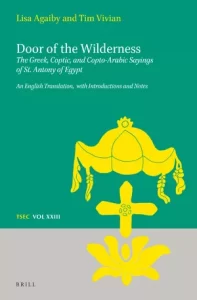 Saint Antony of Egypt (c. 251–356), often called “the father of monasticism,” has numerous representations: the Antony of the Life of Antony and the Letters, but also the Antony of around 120 sayings or apophthegmata. This volume presents fresh English translations of the Greek and Coptic sayings, as well as the first English translation of the Copto-Arabic sayings that are based on unpublished manuscripts. The volume thus opens the door to a richer image of Saint Antony’s many identities across various languages and traditions.
Saint Antony of Egypt (c. 251–356), often called “the father of monasticism,” has numerous representations: the Antony of the Life of Antony and the Letters, but also the Antony of around 120 sayings or apophthegmata. This volume presents fresh English translations of the Greek and Coptic sayings, as well as the first English translation of the Copto-Arabic sayings that are based on unpublished manuscripts. The volume thus opens the door to a richer image of Saint Antony’s many identities across various languages and traditions.
Money Talks: Capitalist Ethics, Colonialism & Divine Governance
John Bottomley
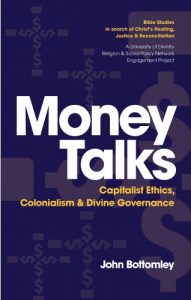 The Gospels of Luke and John invite reflection on how the teachings of Jesus call us to reflect seriously on the attraction of wealth and the need for individuals and churches to get our priorities right in this area. The studies also focus on the business ethics, powerlessness, responsibility, forgiveness and wellbeing experienced by employees in the finance sector, when treatment by their employers resulted in threats, job losses and personal tragedies. Using actual case studies, groups are asked to reflect on their own experiences of acting with integrity and compassion in challenging life situations. Suggestions for personal and congregational practical action are also provided.
The Gospels of Luke and John invite reflection on how the teachings of Jesus call us to reflect seriously on the attraction of wealth and the need for individuals and churches to get our priorities right in this area. The studies also focus on the business ethics, powerlessness, responsibility, forgiveness and wellbeing experienced by employees in the finance sector, when treatment by their employers resulted in threats, job losses and personal tragedies. Using actual case studies, groups are asked to reflect on their own experiences of acting with integrity and compassion in challenging life situations. Suggestions for personal and congregational practical action are also provided.
“The Imperial Context of the Pentateuch”
Chapter of The Oxford Handbook of the Pentateuch
Mark Brett
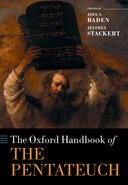 This chapter explores the variety of ways in which the Persian imperial context may have helped to shape, directly or indirectly, the authority and the content of the Torah as the five books of Moses. It critically evaluates the theory that the Pentateuch was officially authorized by the Persians, and finds this scenario much less convincing than more subtle accounts of imperial pressure giving rise to a series of compromises—between priestly and non-priestly literature and between the temples of Jerusalem and Mount Gerizim. Unlike the book of Ezra, the Pentateuch studiously avoids giving priority either to Jerusalem or to Gerizim, while hexateuchal redactions affirm the north. The chapter also considers proposals for understanding the pentateuchal traditions through the lens of postcolonial studies, clarifying the ways in which this research paradigm highlights the dynamics of mimicry, while undermining assumed distinctions between local agency and imperial administration.
This chapter explores the variety of ways in which the Persian imperial context may have helped to shape, directly or indirectly, the authority and the content of the Torah as the five books of Moses. It critically evaluates the theory that the Pentateuch was officially authorized by the Persians, and finds this scenario much less convincing than more subtle accounts of imperial pressure giving rise to a series of compromises—between priestly and non-priestly literature and between the temples of Jerusalem and Mount Gerizim. Unlike the book of Ezra, the Pentateuch studiously avoids giving priority either to Jerusalem or to Gerizim, while hexateuchal redactions affirm the north. The chapter also considers proposals for understanding the pentateuchal traditions through the lens of postcolonial studies, clarifying the ways in which this research paradigm highlights the dynamics of mimicry, while undermining assumed distinctions between local agency and imperial administration.
“Settler Mandates and the Book of Joshua”
Chapter of The Cambridge Companion to the Hebrew Bible and Ethics
Mark Brett
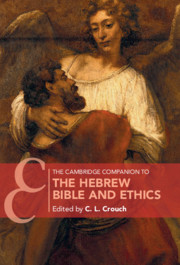 The book of Joshua presents a multitude of ethical quandaries, both ancient and modern. After identifying some of the key questions about the text and its composition, our discussion will trace the distinctive kinds of influence that this book has exercised in a number of Jewish and Christian traditions. All of these elements will then figure in concluding reflections on how the book of Joshua may, and may not, help us to reflect on the legacies of imperialism and colonialism.
The book of Joshua presents a multitude of ethical quandaries, both ancient and modern. After identifying some of the key questions about the text and its composition, our discussion will trace the distinctive kinds of influence that this book has exercised in a number of Jewish and Christian traditions. All of these elements will then figure in concluding reflections on how the book of Joshua may, and may not, help us to reflect on the legacies of imperialism and colonialism.
“Postcolonial Colonialism and its Multiple Contexts of Solidarity”
Chapter in Theological and Hermeneutical Explorations from Australia: Horizons of Contextuality
Mark Brett
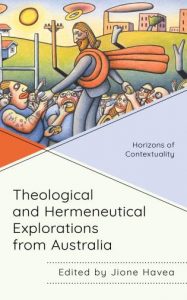 What is contextual theology? The question is more complicated than it appears. On many accounts, contextual theology is framed as an attempt to repent of ideological generalisations and address more local concerns—concerns that have been construed by some critics as “parochial.” 1 For example, an embrace of Aboriginal and Torres Strait Islander Christianities in Australia will inevitably have a localized focus, 2 but this is a matter of justice within postcolonial theology. In this chapter, I suggest that contextual approaches reflect patterns of solidarity as much as questions of theological method. In particular, I argue that theological education in settler colonial contexts will require multiple levels of solidarity with Indigenous peoples. I will also show how some notions of theology and religion in Australian scholarship have made the practice of solidarity more difficult.
What is contextual theology? The question is more complicated than it appears. On many accounts, contextual theology is framed as an attempt to repent of ideological generalisations and address more local concerns—concerns that have been construed by some critics as “parochial.” 1 For example, an embrace of Aboriginal and Torres Strait Islander Christianities in Australia will inevitably have a localized focus, 2 but this is a matter of justice within postcolonial theology. In this chapter, I suggest that contextual approaches reflect patterns of solidarity as much as questions of theological method. In particular, I argue that theological education in settler colonial contexts will require multiple levels of solidarity with Indigenous peoples. I will also show how some notions of theology and religion in Australian scholarship have made the practice of solidarity more difficult.
Constructing Eschatology: Rethinking the Prophecy in Isaiah
Nixon de Vera
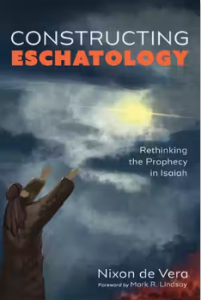 This work seeks to provide a critical analysis of the prophecies in the book of Isaiah that parallels the prophetic insights in the book of Revelation. The underlying question is, “To what extent has God foreordained things, especially before and during the final judgment?” The author thinks all that concerns God’s majestic plan, i.e., to accomplish God’s purpose for humanity, is covered in its entirety. God is highly active in foreordaining things, and whatever God foreordains shall be fulfilled in the end. Isaiah’s conception of the interplay between the themes of punishment and healing is central to his eschatological trajectory. In this respect, theologically speaking, the total restoration of Israel signifies the restoration of all humankind. Such an eschatology might accommodate the notion of Christian Universalism.
This work seeks to provide a critical analysis of the prophecies in the book of Isaiah that parallels the prophetic insights in the book of Revelation. The underlying question is, “To what extent has God foreordained things, especially before and during the final judgment?” The author thinks all that concerns God’s majestic plan, i.e., to accomplish God’s purpose for humanity, is covered in its entirety. God is highly active in foreordaining things, and whatever God foreordains shall be fulfilled in the end. Isaiah’s conception of the interplay between the themes of punishment and healing is central to his eschatological trajectory. In this respect, theologically speaking, the total restoration of Israel signifies the restoration of all humankind. Such an eschatology might accommodate the notion of Christian Universalism.
Creating Gender in the Garden: The Inconstant Partnership of Eve and Adam
Barbara Deutschmann
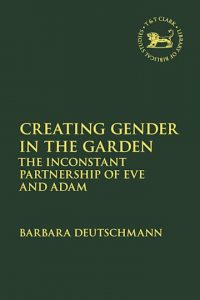 What can explain the persistence of gender inequality throughout history? Do narratives such as the Eden story explain that dissymmetry or contribute to it? This book suggests that the Hebrew Bible began and has sustained a rich conversation about sex and gender throughout its life. A literary study of the Garden of Eden story reveals a focus on the human partnership as integral to the divine creation project. Texts from other Hebrew Bible genres build a picture of robust and flexible partnerships within a patriarchal framework.
What can explain the persistence of gender inequality throughout history? Do narratives such as the Eden story explain that dissymmetry or contribute to it? This book suggests that the Hebrew Bible began and has sustained a rich conversation about sex and gender throughout its life. A literary study of the Garden of Eden story reveals a focus on the human partnership as integral to the divine creation project. Texts from other Hebrew Bible genres build a picture of robust and flexible partnerships within a patriarchal framework.
Divine Violence in the Book of Samuel
Rachelle Gilmour
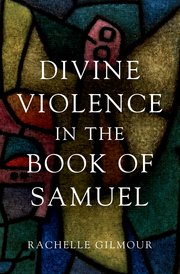 In Divine Violence in the Book of Samuel, Rachelle Gilmour explores the narratives of divine violence in the Book of Samuel from ethical, literary, and political perspectives, in dialogue with the thought of Immanuel Kant, Martha Nussbaum and Walter Benjamin. She addresses such questions as: Is the God of Samuel a capricious God with a troubling dark side? Is punishment for sin the only justifiable violence in these narratives? Why does God continue to punish those already declared forgiven? What is the role of God’s emotions in acts of divine violence? In what political contexts might narratives of divine violence against God’s own kings, and God’s own people have arisen?
In Divine Violence in the Book of Samuel, Rachelle Gilmour explores the narratives of divine violence in the Book of Samuel from ethical, literary, and political perspectives, in dialogue with the thought of Immanuel Kant, Martha Nussbaum and Walter Benjamin. She addresses such questions as: Is the God of Samuel a capricious God with a troubling dark side? Is punishment for sin the only justifiable violence in these narratives? Why does God continue to punish those already declared forgiven? What is the role of God’s emotions in acts of divine violence? In what political contexts might narratives of divine violence against God’s own kings, and God’s own people have arisen?
Imagination in an Age of Crisis: Soundings from the Arts and Theology
Edited by Jason Goroncy and Rod Pattenden
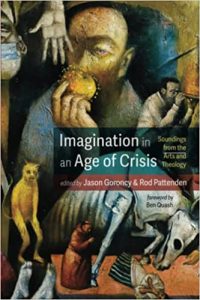 This book explores the vital role of the imagination in today’s complex climates–cultural, environmental, political, racial, religious, spiritual, intellectual, etc. It asks: What contribution do the arts make in a world facing the impacts of globalism, climate change, pandemics, and losses of culture? What wisdom and insight, and orientation for birthing hope and action in the world, do the arts offer to religious faith and to theological reflection? These essays, poems, and short reflections–written by art practitioners and academics from a diversity of cultures and religious traditions–demonstrate the complex cross-cultural nature of this conversation, examining critical questions in dialogue with various art forms and practices, and offering a way of understanding how the human imagination is formed, sustained, employed, and expanded. Marked by beauty and wonder, as well as incisive critique, it is a unique collection that brings unexpected voices into a global conversation about imagining human futures.
This book explores the vital role of the imagination in today’s complex climates–cultural, environmental, political, racial, religious, spiritual, intellectual, etc. It asks: What contribution do the arts make in a world facing the impacts of globalism, climate change, pandemics, and losses of culture? What wisdom and insight, and orientation for birthing hope and action in the world, do the arts offer to religious faith and to theological reflection? These essays, poems, and short reflections–written by art practitioners and academics from a diversity of cultures and religious traditions–demonstrate the complex cross-cultural nature of this conversation, examining critical questions in dialogue with various art forms and practices, and offering a way of understanding how the human imagination is formed, sustained, employed, and expanded. Marked by beauty and wonder, as well as incisive critique, it is a unique collection that brings unexpected voices into a global conversation about imagining human futures.
God in the Landscape: Studies in the Literary History of Australian Protestant Dissent
Kerrie Handasyde
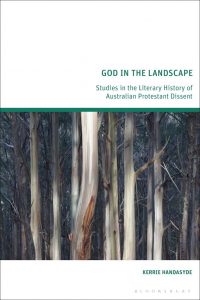 This book shows how creative writing gives voice to the drama and nuance of religious experience in a way that is rarely captured by sermons, reports, and the minutes of church meetings. The author explores the history of religious Dissent and Evangelicalism in Australia through a variety of literary responses to landscape, from both men and women, lay and ordained.
This book shows how creative writing gives voice to the drama and nuance of religious experience in a way that is rarely captured by sermons, reports, and the minutes of church meetings. The author explores the history of religious Dissent and Evangelicalism in Australia through a variety of literary responses to landscape, from both men and women, lay and ordained.
A Friendly Guide to Women in the Old Testament
Janina Hiebel
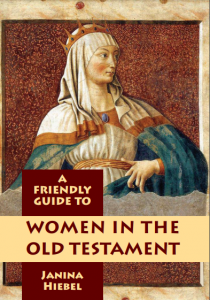 This Friendly Guide to Women in the Old Testament provides an easy-to-follow introduction to the stories of women in a range of Old Testament writings for readers of the twenty-first century. It presents an opportunity to explore biblical texts and characters that can be challenging to modern readers, and to discover their relevance and meaning today.
This Friendly Guide to Women in the Old Testament provides an easy-to-follow introduction to the stories of women in a range of Old Testament writings for readers of the twenty-first century. It presents an opportunity to explore biblical texts and characters that can be challenging to modern readers, and to discover their relevance and meaning today.
Epicureanism and the Gospel of John: A Study of their Compatibility
Fergus King
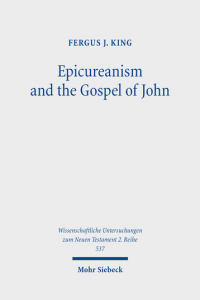 The Gospel of John and Epicureanism share vocabulary and reject the conventions of Graeco-Roman theology. Would it then have been easy for an Epicurean to become a Christian or vice-versa? Fergus J. King suggests that such claims become unlikely when detailed analyses of the two traditions are set out and compared. The first step in his examination looks at evidence for potential engagement between the two traditions historically and geographically. Both traditions address concerns about the good life, death, and the divine. However, this correspondence soon unravels as their worldviews are far from identical. Shared terms (like Saviour), their respective rituals, and teaching about community life reveal substantial differences in ethos and behaviour.
The Gospel of John and Epicureanism share vocabulary and reject the conventions of Graeco-Roman theology. Would it then have been easy for an Epicurean to become a Christian or vice-versa? Fergus J. King suggests that such claims become unlikely when detailed analyses of the two traditions are set out and compared. The first step in his examination looks at evidence for potential engagement between the two traditions historically and geographically. Both traditions address concerns about the good life, death, and the divine. However, this correspondence soon unravels as their worldviews are far from identical. Shared terms (like Saviour), their respective rituals, and teaching about community life reveal substantial differences in ethos and behaviour.
Nuru na Uzima: Essays Celebrating the Golden Jubilee of the Anglican Church of Tanzania, 1970-2020.
Edited by Fergus King, Emmanuel Mbennah, Mecka Ogunde, and Dorothy Prentice
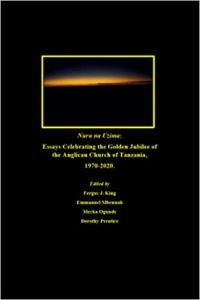 In 1960, as independence began to dawn across sub-Saharan Africa, the Province of the Church of East Africa (PCEA) became an autocephalous body within the Anglican Communion. Ten years later, in 1970, that body would divide into two national provinces, one being the Church of the Province of Tanzania (CPT): a national church for the recently constituted United Republic of Tanzania. Later this would be re-named as the Anglican Church of Tanzania (ACT). In 2020, the ACT celebrated its Golden Jubilee.
In 1960, as independence began to dawn across sub-Saharan Africa, the Province of the Church of East Africa (PCEA) became an autocephalous body within the Anglican Communion. Ten years later, in 1970, that body would divide into two national provinces, one being the Church of the Province of Tanzania (CPT): a national church for the recently constituted United Republic of Tanzania. Later this would be re-named as the Anglican Church of Tanzania (ACT). In 2020, the ACT celebrated its Golden Jubilee.
The essays in this volume provide an historical overview of the origins and key events in the life of the ACT. Contributors from Tanzania and elsewhere, wenyeji na wageni, provide vignettes which explore the ACT’s development in parallel with the political and social life of Tanzania, notably the African Socialism (Ujamaa) and nation-building inspired by Julius K. Nyerere, celebrate its achievements, and ask critical questions about its shortcomings and future.
Publication detailsA Missional Introduction to the New Testament
Fergus King
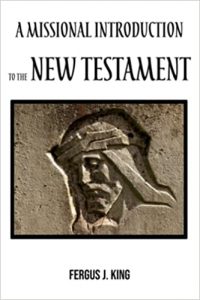 Typically, a New Testament introduction deals with the usual stuff of introductions—authorship, readership, date, genre, and specific content of the books of the New Testament. This is not one of those usual introductions. In A Missional Introduction to the New Testament, Fergus King addresses the typical topics while presenting a New Testament introduction with a missional perspective. This volume is intended to explore what the New Testament teaches about how to be missional while embracing the sending of God—the “missio Dei”.
Typically, a New Testament introduction deals with the usual stuff of introductions—authorship, readership, date, genre, and specific content of the books of the New Testament. This is not one of those usual introductions. In A Missional Introduction to the New Testament, Fergus King addresses the typical topics while presenting a New Testament introduction with a missional perspective. This volume is intended to explore what the New Testament teaches about how to be missional while embracing the sending of God—the “missio Dei”.
Terror in the Bible: Rhetoric, Gender, and Violence
Edited by Monica Jyotsna Melanchthon and Robyn J. Whitaker
Featuring chapters by Monica Jyotsna Melanchthon, Robyn J. Whitaker, Rachelle Gilmour, Dorothy Lee, and Angela Sawyer
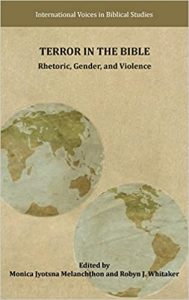 This volume of essays, inspired by Phyllis Trible’s Texts of Terror, examines the terrorizing potential of biblical texts as they intersect with issues of context, gender, caste, violence, and colonisation/imperialism. Contributors writing from Australia, India, New Zealand, Tonga, South Africa, and the US interrogate biblical texts from the Hebrew Bible and New Testament to bring to the fore their terrorizing and terrifying potential and their violent and violating impact particularly on women and minoritized men as they intersect with cultures in their home contexts. A foreword by Phyllis Trible reflects on what motivated her work and how this volume pushes the academy and the church to deal with the violence inherent in some biblical texts.
This volume of essays, inspired by Phyllis Trible’s Texts of Terror, examines the terrorizing potential of biblical texts as they intersect with issues of context, gender, caste, violence, and colonisation/imperialism. Contributors writing from Australia, India, New Zealand, Tonga, South Africa, and the US interrogate biblical texts from the Hebrew Bible and New Testament to bring to the fore their terrorizing and terrifying potential and their violent and violating impact particularly on women and minoritized men as they intersect with cultures in their home contexts. A foreword by Phyllis Trible reflects on what motivated her work and how this volume pushes the academy and the church to deal with the violence inherent in some biblical texts.
Bible Blindspots: Dispersion and Othering
Edited by Jione Havea and Monica Jyotsna Melanchthon
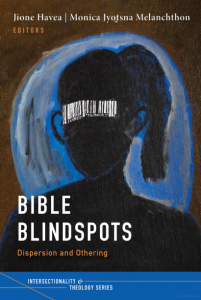 Several of the ways and cultures that the Bible privileges or denounces slip by unnoticed. When those–the privileged and the denounced–are not examined, they fade into and hide in the blind spots of the Bible. This collection of essays engages some of the subjects who face dispersion (physical displacement that sparks ideological bias) and othering (ideologies that manifest in social distancing and political displacement). These include, among others, the builders of Babel, Samaritans, Melchizedek, Jezebel, Judith, Gomer, Ruth, slaves, and mothers. In addition to considering the drive to privilege or denounce, the contributors also attend to subjects ignored because the Bible’s blind spots are not examined. These include planet Earth, indigenous Australians, Palestinians, Dalits, minjungs, battered women, sexual-abuse victims, religious minorities, mothering men, gays, and foreigners. This collection encourages interchanges and exchanges between dispersion and othering, and between the Bible and context. It flows in the currents of postcolonial and gendered studies, and closes with a script that stages a biblical character at the intersection of the Bible’s blind spots and modern readers’ passions and commitments.
Several of the ways and cultures that the Bible privileges or denounces slip by unnoticed. When those–the privileged and the denounced–are not examined, they fade into and hide in the blind spots of the Bible. This collection of essays engages some of the subjects who face dispersion (physical displacement that sparks ideological bias) and othering (ideologies that manifest in social distancing and political displacement). These include, among others, the builders of Babel, Samaritans, Melchizedek, Jezebel, Judith, Gomer, Ruth, slaves, and mothers. In addition to considering the drive to privilege or denounce, the contributors also attend to subjects ignored because the Bible’s blind spots are not examined. These include planet Earth, indigenous Australians, Palestinians, Dalits, minjungs, battered women, sexual-abuse victims, religious minorities, mothering men, gays, and foreigners. This collection encourages interchanges and exchanges between dispersion and othering, and between the Bible and context. It flows in the currents of postcolonial and gendered studies, and closes with a script that stages a biblical character at the intersection of the Bible’s blind spots and modern readers’ passions and commitments.
“How Relationality Facilitates Human Flourishing: A Neurobiological and Christological Conversation”
Chapter in Wesleyan Perspectives on Human Flourishing
Emma Moore
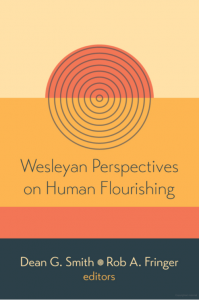 Human flourishing is an ever-expanding concept that crosses geographic, ethnic, cultural, and religious lines as persons, both individually and corporately, seek to find happiness, fulfilment, and purpose. This book brings together well-established and burgeoning Wesleyan scholars to consider not only John and Charles Wesley’s understanding of human flourishing but the broader Wesleyan perspectives on contemporary issues such as calling, creation care, healthcare, education, technological enhancements, death and dying, and more. Throughout these chapters the complexities and challenges of life, both past and present, are explored and grappled with, and we are reminded over and again that God is the ultimate source of flourishing.
Human flourishing is an ever-expanding concept that crosses geographic, ethnic, cultural, and religious lines as persons, both individually and corporately, seek to find happiness, fulfilment, and purpose. This book brings together well-established and burgeoning Wesleyan scholars to consider not only John and Charles Wesley’s understanding of human flourishing but the broader Wesleyan perspectives on contemporary issues such as calling, creation care, healthcare, education, technological enhancements, death and dying, and more. Throughout these chapters the complexities and challenges of life, both past and present, are explored and grappled with, and we are reminded over and again that God is the ultimate source of flourishing.
Illuminating the New Testament: The Gospels, Acts, and Paul
Gerald O’Collins
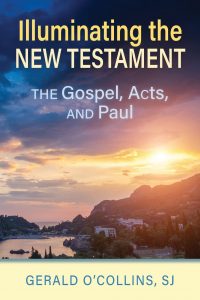 A collection of eighteen essays on the Gospels, Acts, and the letters of Paul, written throughout Gerald O’Collins’s distinguished career.
A collection of eighteen essays on the Gospels, Acts, and the letters of Paul, written throughout Gerald O’Collins’s distinguished career.
“The Emperor’s Floor and the Naked Wife: Chrysostom’s retelling of imperial history in In Philippenses hom. 16 and the fate of Fausta”
Chapter in Making and Unmaking Ancient Memory
Katherin Papadopoulos
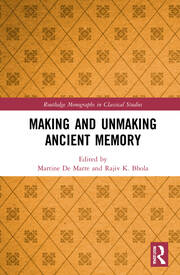 Emperors were selectively held up as exemplars of power and virtue in late antiquity. In his 16th homily on Paul’s letter to the Philippians, John Chrysostom presents a list of imperial misfortunes to illustrate that not even emperors are immune from troubles. Scholars have argued over this passage’s historical veracity and its usefulness in reconstructing events as they happened, especially around the death of Fausta, wife of Constantine I. But to read this passage as a source for recovering the past is to overlook the text’s presentation of a web of collective memories overlaid by Chrysostom’s advancement of a counter-memory. This study analyses Chrysostom’s account of imperial woes as they are remembered and argues that Chrysostom uses a number of rhetorical strategies to reframe a collectively remembered past and present emperors as impotent outsiders in relation to his Christian community. It further argues that Chrysostom draws from a written source when recalling the fate of a woman believed to be Fausta, and that the source draws on cultural memory to reinforce the claim that she was punished for committing adultery. Nevertheless, this cannot be seen as evidence of the claim’s veracity. Rather, Chrysostom’s focus remains on presenting emperors as anti-exemplars.
Emperors were selectively held up as exemplars of power and virtue in late antiquity. In his 16th homily on Paul’s letter to the Philippians, John Chrysostom presents a list of imperial misfortunes to illustrate that not even emperors are immune from troubles. Scholars have argued over this passage’s historical veracity and its usefulness in reconstructing events as they happened, especially around the death of Fausta, wife of Constantine I. But to read this passage as a source for recovering the past is to overlook the text’s presentation of a web of collective memories overlaid by Chrysostom’s advancement of a counter-memory. This study analyses Chrysostom’s account of imperial woes as they are remembered and argues that Chrysostom uses a number of rhetorical strategies to reframe a collectively remembered past and present emperors as impotent outsiders in relation to his Christian community. It further argues that Chrysostom draws from a written source when recalling the fate of a woman believed to be Fausta, and that the source draws on cultural memory to reinforce the claim that she was punished for committing adultery. Nevertheless, this cannot be seen as evidence of the claim’s veracity. Rather, Chrysostom’s focus remains on presenting emperors as anti-exemplars.
Johannine Social Identity Formation after the Fall of the Jerusalem Temple
Christopher Porter
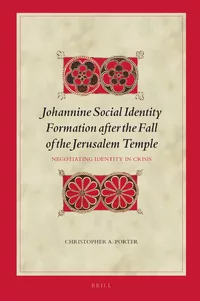 In Johannine Social Identity Formation after the Fall of the Jerusalem Temple Christopher Porter reads the Fourth Gospel through the lens of social identity theory as means of reconciling the social dislocation and trauma of the destruction of the Jerusalem temple. Analysing the Fourth Gospel in conversation with other temple-removed texts of Qumran, Philo, and Josephus the gospel’s intent to renegotiate cultic life without the temple can be seen. Through this analysis it is argued that the Fourth Gospel primarily functions as an intra-mural Jewish text, attempting to negotiate the formation of a Jesus-follower social identity in direct continuity with earlier Jewish shared social narratives. Finally, this work reviews the Johannine Community as an outcome of the Gospel identity formation.
In Johannine Social Identity Formation after the Fall of the Jerusalem Temple Christopher Porter reads the Fourth Gospel through the lens of social identity theory as means of reconciling the social dislocation and trauma of the destruction of the Jerusalem temple. Analysing the Fourth Gospel in conversation with other temple-removed texts of Qumran, Philo, and Josephus the gospel’s intent to renegotiate cultic life without the temple can be seen. Through this analysis it is argued that the Fourth Gospel primarily functions as an intra-mural Jewish text, attempting to negotiate the formation of a Jesus-follower social identity in direct continuity with earlier Jewish shared social narratives. Finally, this work reviews the Johannine Community as an outcome of the Gospel identity formation.
A Dialogue between Haizi’s Poetry and the Gospel of Luke: Chinese Homecoming and the Relationship with Jesus Christ – Chinese version
Xiaoli Yang
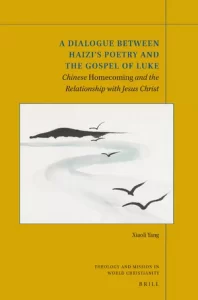 In A Dialogue between Haizi’s Poetry and the Gospel of Luke Xiaoli Yang offers a conversation between the Chinese soul-searching found in Haizi’s (1964–1989) poetry and the gospel of Jesus Christ through Luke’s testimony. It creates a unique contextual poetic lens that appreciates a generation of the Chinese homecoming journey through Haizi’s poetry, and explores its relationship with Jesus Christ. As the dialogical journey, it names four stages of homecoming—roots, vision, journey and arrival. By taking an interdisciplinary approach—literary study, inter-cultural dialogue and comparative theology, Xiaoli Yang convincingly demonstrates that the common language between the poet Haizi and the Lukan Jesus provides a crucial and rich source of data for an ongoing table conversation between culture and faith. The English version can be found here.
In A Dialogue between Haizi’s Poetry and the Gospel of Luke Xiaoli Yang offers a conversation between the Chinese soul-searching found in Haizi’s (1964–1989) poetry and the gospel of Jesus Christ through Luke’s testimony. It creates a unique contextual poetic lens that appreciates a generation of the Chinese homecoming journey through Haizi’s poetry, and explores its relationship with Jesus Christ. As the dialogical journey, it names four stages of homecoming—roots, vision, journey and arrival. By taking an interdisciplinary approach—literary study, inter-cultural dialogue and comparative theology, Xiaoli Yang convincingly demonstrates that the common language between the poet Haizi and the Lukan Jesus provides a crucial and rich source of data for an ongoing table conversation between culture and faith. The English version can be found here.
“The Letter to Titus”
Chapter in An Asian Introduction to the New Testament
Xiaoli Yang
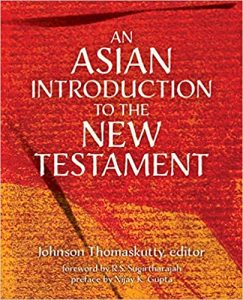 Understanding and assessing the New Testament writings from Asian viewpoints provides a unique and original outlook for interpretation of the Christian Scriptures. To that end, An Asian Introduction to the New Testament is the first book of its kind to take full account of the multireligious, multiethnic, multilingual, multicultural, and pluralistic contexts in which Asian Christians find themselves. Into this already complex world, issues of poverty, casteism, class structure, honor and shame aspects, colonial realities, discrimination against women, natural calamities and ecological crises, and others add more layers of complexity.
Understanding and assessing the New Testament writings from Asian viewpoints provides a unique and original outlook for interpretation of the Christian Scriptures. To that end, An Asian Introduction to the New Testament is the first book of its kind to take full account of the multireligious, multiethnic, multilingual, multicultural, and pluralistic contexts in which Asian Christians find themselves. Into this already complex world, issues of poverty, casteism, class structure, honor and shame aspects, colonial realities, discrimination against women, natural calamities and ecological crises, and others add more layers of complexity.


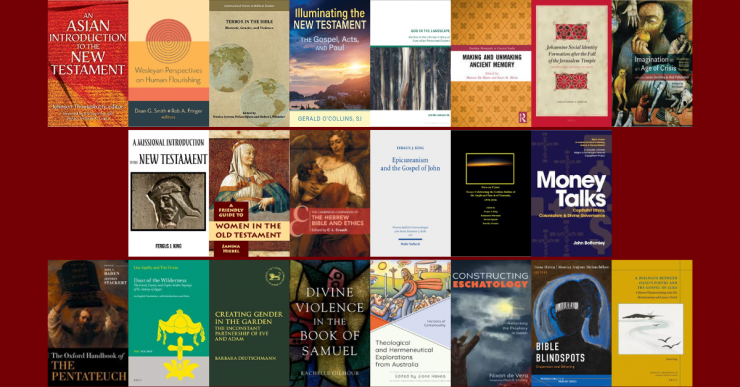

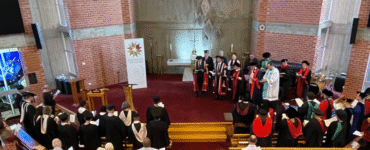

Add comment